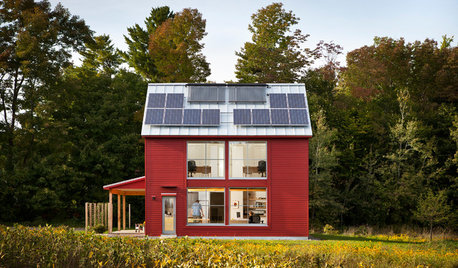Help buying bulk compost? Basic principles plus local brand names
kristimama
12 years ago
Related Stories

GARDENING GUIDESGet on a Composting Kick (Hello, Free Fertilizer!)
Quit shelling out for pricey substitutes that aren’t even as good. Here’s how to give your soil the best while lightening your trash load
Full Story
ARCHITECTUREDesign Practice: The Basics of Marketing Your Business
Pro to pro: Attract clients and get paying work by drawing attention to your brand in the right places
Full Story
KITCHEN DESIGN9 Popular Stovetop Options — Plus Tips for Choosing the Right One
Pick a stovetop that fits your lifestyle and your kitchen style with this mini guide that covers all the basics
Full Story
GREEN BUILDINGGoing Solar at Home: Solar Panel Basics
Save money on electricity and reduce your carbon footprint by installing photovoltaic panels. This guide will help you get started
Full Story
DECKSDecking Materials Beyond Basic Lumber
Learn about softwoods, tropical hardwoods, composites and more for decks, including pros, cons and costs
Full Story
ARTLet's Put a Price on Art: Your Guide to Art Costs and Buying
We paint you a picture of what affects an artwork's price — plus a little-known way to take home what you love when it's beyond your budget
Full Story
ORGANIZINGDo It for the Kids! A Few Routines Help a Home Run More Smoothly
Not a Naturally Organized person? These tips can help you tackle the onslaught of papers, meals, laundry — and even help you find your keys
Full Story
MOVINGRelocating Help: 8 Tips for a Happier Long-Distance Move
Trash bags, houseplants and a good cry all have their role when it comes to this major life change
Full Story
MOST POPULAR9 Real Ways You Can Help After a House Fire
Suggestions from someone who lost her home to fire — and experienced the staggering generosity of community
Full Story
COLORPick-a-Paint Help: How to Create a Whole-House Color Palette
Don't be daunted. With these strategies, building a cohesive palette for your entire home is less difficult than it seems
Full Story





Kimmsr
kristimamaOriginal Author
Related Professionals
Fitchburg Landscape Architects & Landscape Designers · Pottstown Landscape Contractors · Peabody Landscape Contractors · Bridgeview Landscape Contractors · Fair Lawn Landscape Contractors · Lakewood Landscape Contractors · Mahwah Landscape Contractors · Middletown Landscape Contractors · Tavares Landscape Contractors · Bellingham Decks, Patios & Outdoor Enclosures · Frederick Decks, Patios & Outdoor Enclosures · Mitchellville Decks, Patios & Outdoor Enclosures · Philadelphia Decks, Patios & Outdoor Enclosures · Pittsburgh Decks, Patios & Outdoor Enclosures · Genesee Stone, Pavers & ConcreteLloyd
ZoysiaSod
Kimmsr
art_1
kristimamaOriginal Author
Kimmsr
kristimamaOriginal Author
Kimmsr
Hayleysc